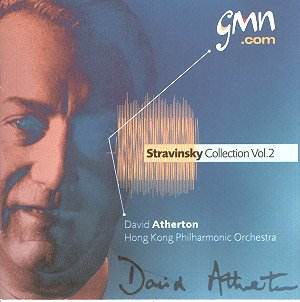Igor STRAVINSKY
(1888-1971)
Stravinsky Collection Vol. 2
4 Norwegian Moods
Capriccio
Ode
Danses
Concertantes
 Peter Donohoe (piano)
Peter Donohoe (piano)
Hong Kong Philharmonic/David Atherton
rec. 4-6. 7. 95, Tsuen Wan Town Hall, Hong
Kong
 GMN.com GMNCD102
[56.03]
GMN.com GMNCD102
[56.03]
Crotchet
AmazonUK AmazonUS

Listed Comparisons
4 Norwegian Moods
CBC Symphony Orchestra/Composer Sony SMK 46 296(rec. Toronto, Canada,
29. 3. 1963)
Capriccio
Philippe Entremont, Columbia Symphony Orchestra/Robert Craft, under the
supervision of the Composer Sony SMK 46 295 (rec. Toronto, Canada, 3. 1.
1966)
Danses Concertantes
Columbia Chamber Orchestra/Robert Craft, under the supervision of the Composer
Sony SMK 46 302 (rec. Hollywood, California, 20. 1. 1967)
GMN.com are fairly new to me as is their attractive turquoise packaging into
which is deliquescently melted the image of the composer/performer. With
jazzy miniature labellings, this might suggest the thirty-something sexist
little man who says he likes his cars fast, his beers cold, his women exciting
and his music played on. Even so he doesn't deserve this. The packaging is
swish till one turns the pages and finds it virtually illegible, with tiny
black print on white, with great grey target logos blotting out most of it.
Come off it guys, I've had a hard day's accounting and a hard woman to satisfy.
Don't do this to me, make it big and sexy and brief. Quite. And for the rest
of us, of either sex, make it big, sexy and as long as you like; but I'll
bet Martin Ross the excellent note-writer wanted it to be read by more than
reviewers.
I wonder if GMN fully know what they assembled here. Perhaps that's unfair.
What they've managed is quite impressive, Paul Crossley on Takemitsu piano
music, and David Atherton with Peter Donohoe and the Hong Kong Philharmonic
for this second in, so far, five volumes.
David Atherton has been lost to us in Hong Kong for so long that it's worth
recalling he was once the brightest British hope in young conducting. GMN
have done him proud with plaudits, quoting Tippett saying he's 'a conductor
of genius'. He's been long admired in Stravinsky, and I can think of only
Oliver Knussen today who rivals him in an overall grasp and realisation of
Stravinsky. That's leaving aside older conductors like Dutoit, Colin Davis,
and Robert Craft. Yet having secured his services, they've taken nearly six
years to release this. I tried to find out if they've re-released it under
licence, but can find no trace.
This disc is mainly neo-classic and minor Stravinsky; not to frighten him/her
off his/her Sancerre. 4 Norwegian Moods is marginally slower, for
the most part, than the composer's Sony versions. There, the horns are brought
forward to fruitier effect, blowing ripe brie. In the Capriccio Philippe
Entremont is on his early brilliant best form for the Craft, 'supervised'
by the composer, and is forwardly placed. Atherton and Donohoe match him
almost exactly in the outer movements, and take off 23 seconds in the
andante rapsodico. Wind arabesques wind around the piano in the composer's
version, and the whole is allowed to breathe - not always the case with the
composer. The hard dry 1960s CBS sound has been somewhat tamed in the 1991
Sony transfers. GMN and Mike Hatch, the exemplary engineer, have produced
at their venue a natural gradated sound wholly in keeping with neo-classic
balance: less fruity up-front, more delicate, with a wetter finish. Atherton
makes the woodwind chirp, and the piano, just as punchy, pulls its punches
sonically. This is more in keeping with the neo-classic/baroque concerto
grosso feel of the work. Still, I can't help wondering if Stravinsky intended
the piano to dominate more. It's certainly not backward and Donohoe plays
with the superb dispatch one expects.
The Ode isn't as well known as it should be. Even the BBC programme
the ballets and comparatively little else, bar the festivals. The Ode
was written in memory of Natalie Koussevitsky, and, although commissioned
by her husband, was heartfelt from the composer too. The static ritual of
grief recalls Oedipus Rex and such very different works as
Threni, a well as the more neo-classic neighbours like 4 Norwegian
Moods.
Danses Concertantes, under Atherton, is more delicately sprung, and
here the use of woodwind is telling and attractive. Atherton knows how to
phrase Stravinsky, but he somehow, with Mike Hatch and the orchestra's
assistance, knows how to conjure that world of dynamism and timeless stasis
that haunts even these sprightly sections. Here he takes more time, and Atherton
has the silvery edge in evocation. That's not just the recorded sound. Still,
these are Danses, and Craft is pretty infectious with a greater dry
crump of close-miked bass sounds, swifter, and rather full of dry red wine
at this point; as well he might be, under the benign but on the whole uncritical
gaze of the composer. Stravinsky had long worked out with Craft just how
the work should go; and was happy to let his near-adopted son out of the
mould to replicate him. Like some of the Conversations' witticisms, some
of this is Craft enhancing Stravinsky with the latter's connivance. If the
composer's definitive cycle has the edge, it is in a hard-driven yet always
terrifically rhythmic address in the bouncier scores; the heart of Stravinsky.
Dependant on the rest of the cycle, this could well prove one of the finest,
perhaps the finest, Stravinsky cycle of the decade if for no other reason
than virtually no-one else is recording one. But if they were, I wonder if
I'd think too differently. Oliver Knussen and Esa-Pekka Salonen, over to
you both.
Simon Jenner

